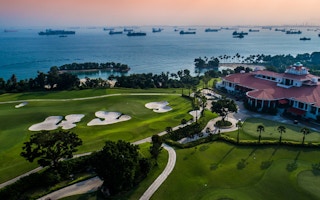A golf club in Singapore has declared that it will be the first in the world to be carbon neutral.
To continue reading, subscribe to Eco‑Business.
There's something for everyone. We offer a range of subscription plans.
- Access our stories and receive our Insights Weekly newsletter with the free EB Member plan.
- Unlock unlimited access to our content and archive with EB Circle.
- Publish your content with EB Premium.
Sentosa Golf Club, Singapore’s most highly-rated golf course located on the resort island of Sentosa, will be carbon neutral by 2022, according to an announcement from the club on Thursday.
To achieve this ambition, the club plans to use funds raised from golf rounds over the next 12 months to purchase carbon offsets that will go towards forest and ocean conservation schemes around the region.
The club already claims to be one of the greenest sporting venues in the world. Its stated accomplishments include attaining Singapore’s highest rating of green building certification through the energy efficiency of its clubhouse, being the first golf club in Asia to introduce lithium battery golf carts, and increasing the efficiency of its irrigation system by deploying 1,200 water-saving sprinklers.
It was also the first golf club to sign up to the United Nations Sports for Climate Action Initiative last year.
The club said its decarbonisation goals align with Sentosa Island’s own ambition to become a carbon neutral destination by 2030.
The carbon neutrality announcement coincides with increasing public debate over golf clubs and their land-use in the city-state. In parliament in February, politicians discussed whether golf courses could be redeveloped instead of clearing forests to make way for public housing.
“While future generations can choose to rebuild golf courses, forests that are now removed will take decades to grow and the connected biodiversity that we lose now may never return,” Member of Parliament Rachel Ong said. She was referring to two forested areas — Clementi Forest and Ulu Pandan Forest — that have stirred public outcry over their planned development into residential estates.
Another politician, Leon Perera, pointed out that most of the leases of Singapore’s eight golf clubs that were slated for expire between 2021 and 2023 have been renewed. The leases for Sentosa Golf Club’s two courses end in 2030 and 2040, respectively.
Sentosa Golf Club’s communications team declined to respond to questions about the offsets scheme or Singapore’s land-use debate. A spokesperson said the club was trying to “champion sustainability within the game of golf to make a positive impact whilst also inspiring others, not just in golf but the wider community.”
Singapore has more golf courses per capita of the population than anywhere in the world, its 17 courses covering 1,500 hectares, or 2 per cent of the island’s land area.










